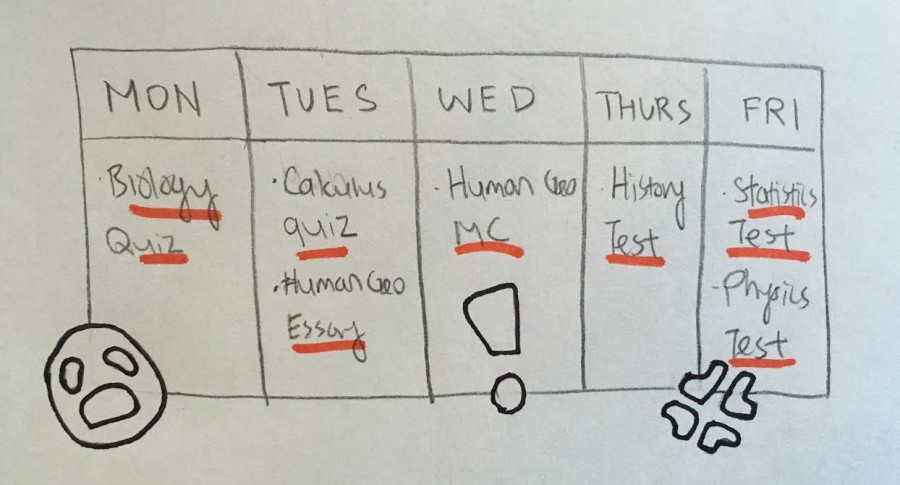Test Abuse-Are We Experiencing It?
November 12, 2015
It is generally believed that the best way to measure students’ learning is to test them on the material. Perhaps testing is one way to check for learning, but how much is necessary? Most Ridge High school students have several assessments every week, and some are even burdened with assessments nearly every day. Testing may have some value, but at a certain point, it detracts from the learning experience itself.
The most publicized effect of excessive testing is the stress and sleep deprivation students experience while preparing for and taking tests. At Ridge, where testing is a main focus of curriculum, these issues have become almost universal among students. Mia Yau ‘18 describes her sleep deprivation: “Usually when I have several tests in one day, I will only get a few hours of sleep the night before in order to study for them. I usually end up feeling so tired the next day I can’t stay awake in my other classes.” Inevitably, the sacrifices Ridge students make to study for their many tests have an effect on their mental and physical well-being, which often harms their performance in other areas.
The excessive testing at Ridge causes many students to associate learning with stress, grades, and tedious memorization; these associations take the enjoyment out of learning the material. Students who are motivated by good grades on tests may begin to feel like learning is a chore rather than a gift.
Not only is test taking momentously stressful for the students at Ridge, but it also is an inefficient way for students to acquire knowledge. Material is taught in neatly divided, small units so that it can be assessed frequently. Unfortunately, this method of chopping the curriculum into many smaller sections presents the material as a group of isolated concepts rather than a series of interrelated ideas. This method of teaching is conducive for frequent testing but can ultimately harm the student’s understanding of concepts because it forces students to focus on memorizing, not learning the material. After each test, a new unit is introduced and students promptly discard the information from the previous unit from their minds to focus on the new material. This superficial way of learning impairs students’ ability to apply the knowledge in the future, whether it be in college or career and makes the learning itself dull and unappealing.
Students’ intrinsic curiosity for subjects should be encouraged through more graded discussions and projects, in which students have the opportunity to share their perspectives and insights with their classmates instead of taking tests. Additionally, perhaps in mathematics classes in which these measures of learning are not possible, students should be required to explain how a concept works on a deeper level and teach it to class members before taking a test.
While occasional assessments can be helpful learning checks, they must be used deliberately and sparingly. Possibly, there should be a test limit, so that classes cover the same amount of material, but in larger chunks so that students can connect subtopics together and remember the information better.
Another solution is midterms; previous Ridge students who experienced them claim that the half-day schedule provided enough time so that they could study comprehensively and maintain a healthy sleeping schedule. Evan Zhang ‘16 mentions that “Bringing back midterms would be beneficial, since students could study without tremendous stress, but they would still have to apply concepts they learned from several chapters.” While midterms would require many administrative and schedule changes, they should still be considered as a solution to the current system of testing.
Perhaps, if the classes teach subjects with a more holistic approach and incorporate different teaching and testing methods, such as the ones aforementioned, Ridge students would be able to manage their stress, understand the material on a profound level, and foster a passion for learning.






Syd Lawrence • Nov 16, 2015 at 11:57 am
I strongly agree with this article’s opinion. Even at Sophomore year, I’ve had a day with around 4 tests at once. Many of my peers are indeed forced to memorize things and forget them later, which becomes catastrophic when larger standardized tests roll around (SAT subject tests, in particular). I have taken the steps to try to connect material, which helps me. However, it would be nice to see these connections exposed more in most classes.
As for the midterms, I would not be opposed. Although it’s another test, a break from frequent tests will help people remember information.